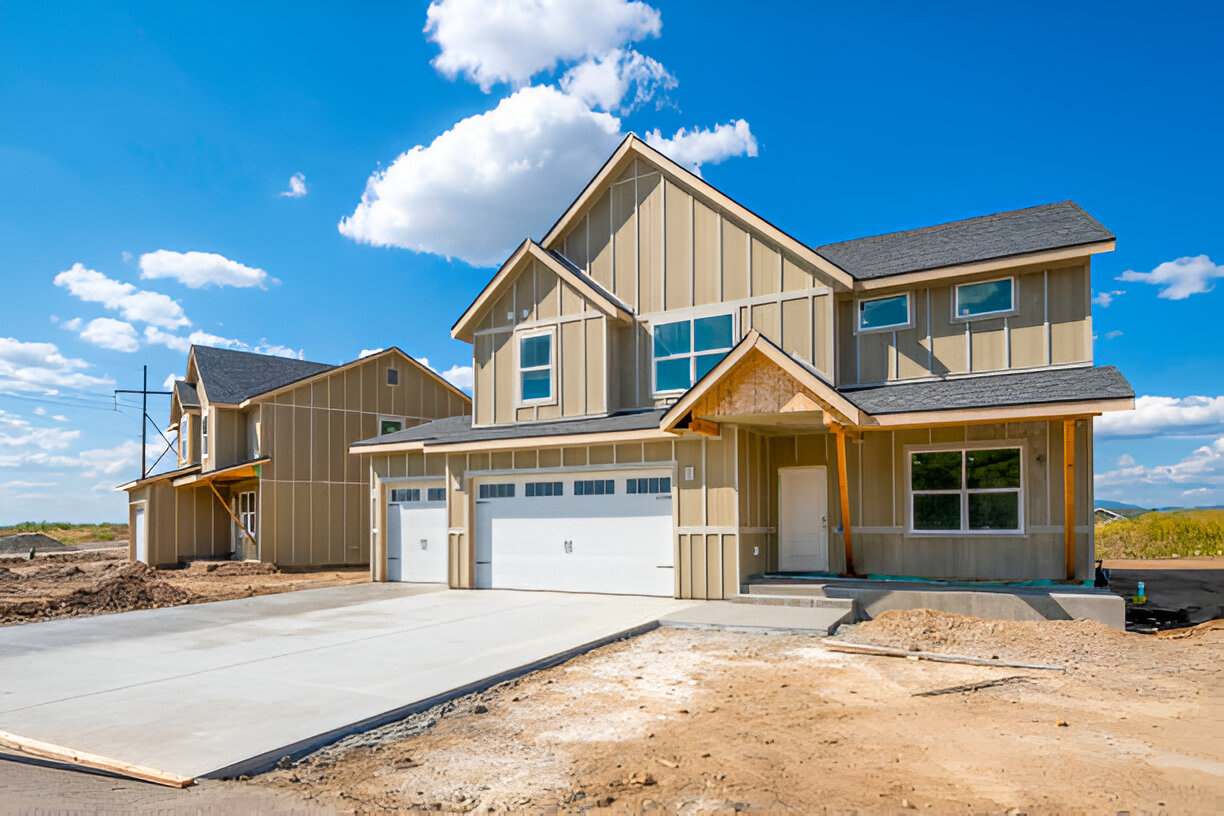
How to Buy a New Construction Home
Buying a new construction home can be an exciting experience, offering modern amenities and energy-efficient features. However, the process differs from purchasing an existing property and requires careful planning. This guide covers essential steps how to buy a new construction home.
Understanding New Construction Options
When venturing into the world of new construction, it’s crucial to familiarize yourself with the various types available. Each option offers different levels of customization and involvement in the building process.
Production homes, often found in planned communities, offer a selection of pre-designed floor plans and limited customization options. These homes are typically built in larger quantities, which can lead to cost savings for buyers.
Semi-custom homes provide a middle ground, allowing buyers to choose from a set of floor plans and then personalize certain aspects of the home’s design. This option balances customization with the efficiency of pre-planned construction.
For those seeking complete control over their home’s design, fully custom homes offer the ultimate in personalization. Working closely with an architect and builder, buyers can create a unique residence tailored to their exact specifications.
Understanding these options will help you determine which type of new construction aligns best with your preferences, budget, and timeline.
Assembling Your Professional Team
Navigating the complexities of new construction purchases requires expert guidance. While builders often have sales representatives on-site, it’s advisable to enlist your own real estate agent who specializes in new construction. An experienced agent can provide invaluable insights, negotiate on your behalf, and ensure your interests are protected throughout the process.
Additionally, securing the services of a reputable real estate attorney can be beneficial, especially when reviewing contracts and navigating the legal aspects of the purchase. Their expertise can help you understand the fine print and avoid potential pitfalls.
Remember, the builder’s representatives, while helpful, ultimately work for the construction company. Having your own team ensures you have advocates focused solely on your best interests.
Financial Preparation and Mortgage Considerations
Before diving into the home search, it’s essential to get your finances in order. Start by obtaining a mortgage pre-approval, which will give you a clear picture of your budget and demonstrate to builders that you’re a serious buyer.
Financing a new construction home varies based on the type of property. For move-in ready production or spec homes, traditional mortgages are common. Building a custom home, however, often requires a construction loan, which differs from standard mortgages.
Construction loans often involve a two-step process: a short-term loan to finance the building phase, followed by conversion to a permanent mortgage upon completion. Some lenders offer construction-to-permanent loans, which streamline this process into a single closing.
Be prepared for potential differences in down payment requirements and interest rates for new construction loans compared to traditional mortgages. Discussing these nuances with multiple lenders can help you find the most favorable terms for your situation.
Researching Builders and Developments
Selecting the right builder is a critical step in ensuring the quality and reliability of your new home. Start by researching builders in your desired area. Look for those with solid reputations and track records of delivering quality homes on time.
Visit model homes and ongoing construction sites to get a feel for the builder’s work. Pay attention to the quality of materials and craftsmanship. Don’t hesitate to ask for references from previous buyers and follow up with them about their experiences.
If you’re considering a planned community, research the development as a whole. Look into future plans for the area, including amenities, schools, and commercial developments. Understanding the long-term vision for the community can help you assess its potential for growth and value appreciation.
Navigating the Design and Customization Process
One of the most exciting aspects of buying a new construction home is the opportunity to personalize your living space. However, it’s important to approach this process strategically to avoid overspending or making choices you might later regret.
Start by prioritizing your must-have features and distinguishing them from nice-to-have upgrades. This will help you allocate your budget effectively. Remember that while model homes often showcase premium finishes, many of these may be upgrades that come at an additional cost.
When selecting finishes and upgrades, consider both your personal preferences and potential resale value. While it’s important to create a home you love, overly personalized choices might limit appeal to future buyers.
Be aware of deadlines for making design decisions, as changes later in the construction process can be costly or impossible. Keep detailed records of all your selections and confirm them in writing with the builder to avoid misunderstandings.
Understanding the Contract and Warranty
The purchase agreement for a new construction home is typically more complex than that of an existing property. It’s crucial to review this document carefully, ideally with the assistance of your real estate agent and attorney.
Pay close attention to the construction timeline, including any clauses related to delays or extensions. Understand the process for change orders and how they might affect the final price and completion date.
Most new homes come with a builder’s warranty, which covers workmanship and materials for a specified period. Familiarize yourself with what’s covered, for how long, and the process for making warranty claims. Some builders offer extended warranties or third-party warranty programs, which may provide additional peace of mind.
Monitoring the Construction Process
Staying involved throughout the building process can help ensure your home meets your expectations. While daily visits to the construction site are unnecessary and often discouraged for safety reasons, periodic check-ins at key stages can be beneficial.
Many builders offer formal walk-throughs at certain milestones, such as after framing and before drywall installation. These are opportunities to ask questions, verify that work is progressing as planned, and address any concerns early on.
Consider hiring a third-party inspector to conduct independent evaluations at crucial stages of construction. While the home will undergo municipal inspections, an additional set of expert eyes can catch potential issues that might otherwise be overlooked.
Preparing for Closing and Final Inspection
As your home nears completion, prepare for the closing process. This typically involves a final walk-through, where you’ll have the opportunity to inspect the finished home and create a punch list of any items that need attention.
Be thorough during this inspection, checking everything from appliance functionality to paint finishes. Don’t hesitate to point out any issues, no matter how small. It’s easier to address these before closing than after you’ve moved in.
Understand the builder’s process for addressing punch list items and get commitments in writing for when and how they’ll be resolved. Some builders may require you to close before all items are completed, so clarify expectations upfront.
Moving In and Post-Move Considerations
Once you’ve closed on your new home, the excitement of moving in begins. However, there are still important considerations to keep in mind.
Be prepared for potential settling and adjustments in a new home. It’s not uncommon for minor issues like nail pops or small cracks to appear as the house settles. Most builders have processes in place to address these normal occurrences.
Familiarize yourself with the operation and maintenance of your home’s systems and appliances. Many builders offer a new homeowner orientation to walk you through these details.
Keep all documentation related to your home, including warranties, manuals, and your purchase agreement, in a safe and accessible place. You may need to reference these in the future for maintenance or warranty claims.
Landscaping and Exterior Considerations
While the interior of your new home may be move-in ready, the exterior often requires additional attention. Many new construction homes come with minimal landscaping, and establishing a lawn and garden can be a significant undertaking.
Consider budgeting for landscaping costs separately from your home purchase. This might include installing irrigation systems, planting trees and shrubs, and creating outdoor living spaces.
If you’re in a planned community, be aware of any homeowners association (HOA) regulations regarding landscaping and exterior modifications. Understanding these rules upfront can help you plan and avoid potential conflicts down the line.
Building Community in a New Development
Moving into a new construction home often means being part of a fledgling community. Embrace the opportunity to connect with neighbors who are likely in the same situation.
Many new developments organize community events or have shared amenities that provide natural opportunities for socializing. Getting involved early can help you feel more connected to your new neighborhood and potentially influence its development.
Be patient as the community grows and evolves. It may take time for all homes to be built and for amenities to be completed. Staying informed about development plans and timelines can help manage expectations and excitement for the future of your new community.
By following these detailed guidelines, you’ll confidently navigate the journey of buying a new construction home. Though the process may seem challenging, the reward of a customized, brand-new home is worth it. With careful planning and the right support, your dream can become a reality.
FAQs
Is it cheaper to build a new house than to buy?
Building a new house can be cheaper if you manage costs carefully, but it often depends on factors like location, materials, and design. While you have more control over custom features, unexpected expenses can arise, potentially making it pricier than buying an existing home.
Can you negotiate a new build home?
Yes, you can negotiate a new build home, especially on upgrades, closing costs, and even the overall price in some cases. Builders may offer incentives or discounts, particularly on properties that have been on the market for a while or nearing the end of a development phase.
How do new build mortgages work?
New build mortgages work similarly to traditional ones but may involve specific conditions, like extended rate locks. If building a custom home, you might need a construction loan, which converts to a mortgage once construction is complete.
What should you do to protect yourself when you buy a newly built home?
To protect yourself when buying a new build, thoroughly review the contract, schedule independent inspections, and research the builder’s reputation. Ensure you understand warranties, and consider hiring a real estate agent experienced in new construction to guide you through the process.


